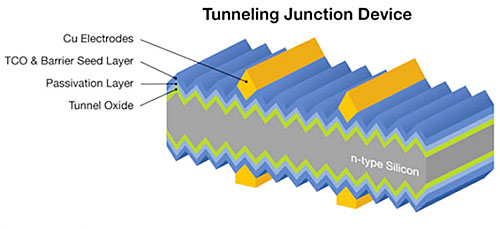Silevo solar cell conversion rate has reached 22.1%
The solar energy innovation and solar module manufacturer Silevo announced on the 9th that the battery conversion efficiency of its proprietary tunnel junction cell structure has been found by Sandia National Laboratories using its production materials and full-scale substrate measurements. It reached 22.1%. This measurement validates that Silevo's Triex® PV modules have the highest energy density in the industry. In addition, it validates plans and plans that Silevo will mass-produce 24% conversions in the coming years.

In addition to high conversion efficiency, Triex hybrid technology also shows the benefits of real world energy harvesting: The results of the California Energy Commission (CEC) show that Silevo PV modules are the first module to use crystalline silicon (C-Si) layers. CEC tested a series of top-level modules using PV-USA test conditions (PTC) to classify module performance in a more realistic real world where air temperature rises. Normally, modules are classified according to standard test conditions (STC) under lower temperature laboratory control conditions. The Triex module's TC/STC ratio (real world performance/laboratory control conditions performance) is 93.49%, ranking first, thanks to its high-performance materials and extremely low battery temperature coefficient device architecture. Therefore, its real-world performance is world-class for the technology using the C-Si layer, and its performance ratio is higher than all other advanced technologies that employ heterostructures, cross-back contacts, and selective emitters.
Silevo continues to focus on the quality and reliability of the Triex modular technology. Triex modules have recently passed rigorous PID and DH tests to withstand high pressure, high temperature, and high humidity tests. The PID and DH tests were conducted by the Renewable Energy Testing Center (RETC), photovoltaic partner of TüV SüD America.
The exposure time of other solar manufacturers' products that meet the PID test is 100-200 hours. Silevo's tolerance of more than 7-15 times under the same conditions further demonstrates the company's focus on long-term reliability. With reliable, high performance, high collection rates and low cost Triex module technology, Silevo is paving the way for its sustainable PV market.
Nails for concrete are called cement nails. Cement Nail, commonly known as Steel Nail, is a nail, using carbon steel production, material has 45 steel or 60 steel, after wire drawing, annealing, nail, quenching and other processes processed, so the texture is relatively hard. Its function is to nail in some of the harder other nails can not nail on the object, because the material and ordinary nails are very different, is a special nail. The Cement Nail`s hardness is very big, is thick but short, pierces the Chisel ability to be very strong. CATEGORIES: Cement Nails Poles have a sliding rod, ruled, twill, spiral, bamboo, and so on, the general is a straight or sliding pole. According to different classification, cement nails can also be divided into: Black Cement nails, blue cement nails, color cement nails, countersunk head cement nails, K cement nails, t cement nails, galvanized cement nails and so on.
Home Concrete Wall nails nails several ways: 1, with cement nails, as the name implies is designed specifically in the concrete wall or brick wall and other hard medium nail things. 2. However, cement nails are sometimes not so good, if some walls really can not nail cement nails, expansion Bolts or expansion bolts, no matter how hard the wall it can handle. 3. However, when using expansion bolts or expansion bolts, an auxiliary tool is needed, which is the electric drill.
4. The head of the drill corresponds to the type of expansion bolt, so be sure to have a drill.
Straight, twill, spiral, bamboo
Nantong Safe Yawl Import &Export Co.,Ltd , https://www.ntsyspring.com
